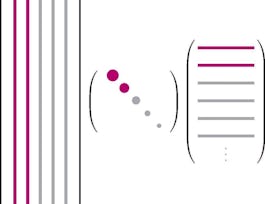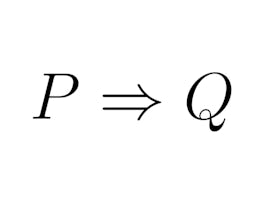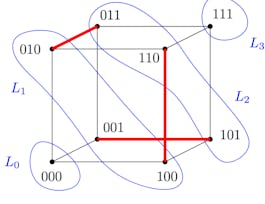This course provides an introduction to complex analysis which is the theory of complex functions of a complex variable. We will start by introducing the complex plane, along with the algebra and geometry of complex numbers, and then we will make our way via differentiation, integration, complex dynamics, power series representation and Laurent series into territories at the edge of what is known today. Each module consists of five video lectures with embedded quizzes, followed by an electronically graded homework assignment. Additionally, modules 1, 3, and 5 also contain a peer assessment.


Introduction to Complex Analysis
Taught in English
Some content may not be translated
68,654 already enrolled
Course
Gain insight into a topic and learn the fundamentals

Instructor: Dr. Petra Bonfert-Taylor
Top Instructor
(1,037 reviews)
Details to know

Add to your LinkedIn profile
8 quizzes
See how employees at top companies are mastering in-demand skills


Earn a career certificate
Add this credential to your LinkedIn profile, resume, or CV
Share it on social media and in your performance review

There are 8 modules in this course
We’ll begin this module by briefly learning about the history of complex numbers: When and why were they invented? In particular, we’ll look at the rather surprising fact that the original need for complex numbers did not arise from the study of quadratic equations (such as solving the equation z^2+1 = 0), but rather from the study of cubic equations! Next we’ll cover some algebra and geometry in the complex plane to learn how to compute with and visualize complex numbers. To that end we’ll also learn about the polar representation of complex numbers, which will lend itself nicely to finding roots of complex numbers. We’ll finish this module by looking at some topology in the complex plane.
What's included
5 videos5 readings1 quiz1 peer review
Complex analysis is the study of functions that live in the complex plane, that is, functions that have complex arguments and complex outputs. The main goal of this module is to familiarize ourselves with such functions. Ultimately we’ll want to study their smoothness properties (that is, we’ll want to differentiate complex functions of complex variables), and we therefore need to understand sequences of complex numbers as well as limits in the complex plane. We’ll use quadratic polynomials as an example in the study of complex functions and take an excursion into the beautiful field of complex dynamics by looking at the iterates of certain quadratic polynomials. This allows us to learn about the basics of the construction of Julia sets of quadratic polynomials. You'll learn everything you need to know to create your own beautiful fractal images, if you so desire. We’ll finish this module by defining and looking at the Mandelbrot set and one of the biggest outstanding conjectures in the field of complex dynamics.
What's included
5 videos5 readings1 quiz
When studying functions we are often interested in their local behavior, more specifically, in how functions change as their argument changes. This leads us to studying complex differentiation – a more powerful concept than that which we learned in calculus. We’ll begin this module by reviewing some facts from calculus and then learn about complex differentiation and the Cauchy-Riemann equations in order to meet the main players: analytic functions. These are functions that possess complex derivatives in lots of places; a fact, which endows them with some of the most beautiful properties mathematics has to offer. We’ll finish this module with the study of some functions that are complex differentiable, such as the complex exponential function and complex trigonometric functions. These functions agree with their well-known real-valued counterparts on the real axis!
What's included
5 videos5 readings1 quiz1 peer review
We’ll begin this module by studying inverse functions of analytic functions such as the complex logarithm (inverse of the exponential) and complex roots (inverses of power) functions. In order to possess a (local) inverse, an analytic function needs to have a non-zero derivative, and we’ll discover the powerful fact that at any such place an analytic function preserves angles between curves and is therefore a conformal mapping! We'll spend two lectures talking about very special conformal mappings, namely Möbius transformations; these are some of the most fundamental mappings in geometric analysis. We'll finish this module with the famous and stunning Riemann mapping theorem. This theorem allows us to study arbitrary simply connected sub-regions of the complex plane by transporting geometry and complex analysis from the unit disk to those domains via conformal mappings, the existence of which is guaranteed via the Riemann Mapping Theorem.
What's included
5 videos5 readings1 quiz
Now that we are familiar with complex differentiation and analytic functions we are ready to tackle integration. But we are in the complex plane, so what are the objects we’ll integrate over? Curves! We’ll begin this module by studying curves (“paths”) and next get acquainted with the complex path integral. Then we’ll learn about Cauchy’s beautiful and all encompassing integral theorem and formula. Next we’ll study some of the powerful consequences of these theorems, such as Liouville’s Theorem, the Maximum Principle and, believe it or not, we’ll be able to prove the Fundamental Theorem of Algebra using Complex Analysis. It's going to be a week filled with many amazing results!
What's included
5 videos5 readings1 quiz1 peer review
In this module we’ll learn about power series representations of analytic functions. We’ll begin by studying infinite series of complex numbers and complex functions as well as their convergence properties. Power series are especially easy to understand, well behaved and easy to work with. We’ll learn that every analytic function can be locally represented as a power series, which makes it possible to approximate analytic functions locally via polynomials. As a special treat, we'll explore the Riemann zeta function, and we’ll make our way into territories at the edge of what is known today such as the Riemann hypothesis and its relation to prime numbers.
What's included
5 videos5 readings1 quiz
Laurent series are a powerful tool to understand analytic functions near their singularities. Whereas power series with non-negative exponents can be used to represent analytic functions in disks, Laurent series (which can have negative exponents) serve a similar purpose in annuli. We’ll begin this module by introducing Laurent series and their relation to analytic functions and then continue on to the study and classification of isolated singularities of analytic functions. We’ll encounter some powerful and famous theorems such as the Theorem of Casorati-Weierstraß and Picard’s Theorem, both of which serve to better understand the behavior of an analytic function near an essential singularity. Finally we’ll be ready to tackle the Residue Theorem, which has many important applications. We’ll learn how to find residues and evaluate some integrals (even some real integrals on the real line!) via this important theorem.
What's included
6 videos6 readings1 quiz
Congratulations for having completed the seven weeks of this course! This module contains the final exam for the course. The exam is cumulative and covers the topics discussed in Weeks 1-7. The exam has 20 questions and is designed to be a two-hour exam. You have one attempt only, but you do not have to complete the exam within two hours. The discussion forum will stay open during the exam. It is against the honor code to discuss answers to any exam question on the forum. The forum should only be used to discuss questions on other material or to alert staff of technical issues with the exam.
What's included
1 quiz
Instructor

Offered by
Recommended if you're interested in Math and Logic

University of Minnesota

University of Amsterdam

Georgia Institute of Technology

Shanghai Jiao Tong University
Why people choose Coursera for their career




Learner reviews
Showing 3 of 1037
1,037 reviews
- 5 stars
85.83%
- 4 stars
12.52%
- 3 stars
1.25%
- 2 stars
0%
- 1 star
0.38%

Open new doors with Coursera Plus
Unlimited access to 7,000+ world-class courses, hands-on projects, and job-ready certificate programs - all included in your subscription
Advance your career with an online degree
Earn a degree from world-class universities - 100% online
Join over 3,400 global companies that choose Coursera for Business
Upskill your employees to excel in the digital economy
Frequently asked questions
Access to lectures and assignments depends on your type of enrollment. If you take a course in audit mode, you will be able to see most course materials for free. To access graded assignments and to earn a Certificate, you will need to purchase the Certificate experience, during or after your audit. If you don't see the audit option:
The course may not offer an audit option. You can try a Free Trial instead, or apply for Financial Aid.
The course may offer 'Full Course, No Certificate' instead. This option lets you see all course materials, submit required assessments, and get a final grade. This also means that you will not be able to purchase a Certificate experience.
When you purchase a Certificate you get access to all course materials, including graded assignments. Upon completing the course, your electronic Certificate will be added to your Accomplishments page - from there, you can print your Certificate or add it to your LinkedIn profile. If you only want to read and view the course content, you can audit the course for free.
You will be eligible for a full refund until two weeks after your payment date, or (for courses that have just launched) until two weeks after the first session of the course begins, whichever is later. You cannot receive a refund once you’ve earned a Course Certificate, even if you complete the course within the two-week refund period. See our full refund policy.


